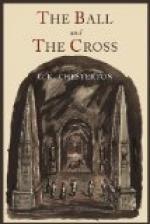“No,” said MacIan, in a voice that shook with a controlled passion. “But France, which was taught by St. Bernard and led to war by Joan of Arc. France that made the crusades. France that saved the Church and scattered the heresies by the mouths of Bossuet and Massillon. France, which shows today the conquering march of Catholicism, as brain after brain surrenders to it, Brunetière, Coppée, Hauptmann, Barrès, Bourget, Lemaître.”
“France!” asserted Turnbull with a sort of rollicking self-exaggeration, very unusual with him, “France, which is one torrent of splendid scepticism from Abelard to Anatole France.”
“France,” said MacIan, “which is one cataract of clear faith from St. Louis to Our Lady of Lourdes.”
“France at least,” cried Turnbull, throwing up his sword in schoolboy triumph, “in which these things are thought about and fought about. France, where reason and religion clash in one continual tournament. France, above all, where men understand the pride and passion which have plucked our blades from their scabbards. Here, at least, we shall not be chased and spied on by sickly parsons and greasy policemen, because we wish to put our lives on the game. Courage, my friend, we have come to the country of honour.”
MacIan did not even notice the incongruous phrase “my friend”, but nodding again and again, drew his sword and flung the scabbard far behind him in the road.
“Yes,” he cried, in a voice of thunder, “we will fight here and He shall look on at it.”
Turnbull glanced at the crucifix with a sort of scowling good-humour and then said: “He may look and see His cross defeated.”
“The cross cannot be defeated,” said MacIan, “for it is Defeat.”
A second afterwards the two bright, blood-thirsty weapons made the sign of the cross in horrible parody upon each other.
They had not touched each other twice, however, when upon the hill, above the crucifix, there appeared another horrible parody of its shape; the figure of a man who appeared for an instant waving his outspread arms. He had vanished in an instant; but MacIan, whose fighting face was set that way, had seen the shape momentarily but quite photographically. And while it was like a comic repetition of the cross, it was also, in that place and hour, something more incredible. It had been only instantaneously on the retina of his eye; but unless his eye and mind were going mad together, the figure was that of an ordinary London policeman.
He tried to concentrate his senses on the sword-play; but one half of his brain was wrestling with the puzzle; the apocalyptic and almost seraphic apparition of a stout constable out of Clapham on top of a dreary and deserted hill in France. He did not, however, have to puzzle long. Before the duellists had exchanged half a dozen passes, the big, blue policeman appeared once more on the top of the hill, a palpable monstrosity in the eye of heaven. He was waving only one arm now and seemed to be shouting directions. At the same moment a mass of blue blocked the corner of the road behind the small, smart figure of Turnbull, and a small company of policemen in the English uniform came up at a kind of half-military double.




